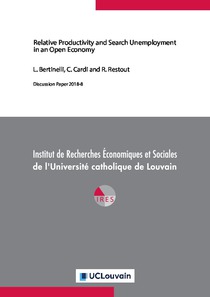Relative productivity and search unemployment in an open economy
"This paper develops a tractable version of a two-sector open economy model with search frictions to disentangle the implications of workers’ mobility costs and labor market institutions following higher relative productivity of tradables. Using a panel of eighteen OECD countries, our estimates...
| Main Authors: | , , |
|---|---|
| Institution: | ETUI-European Trade Union Institute |
| Format: | TEXT |
| Language: | English |
| Published: |
Louvain-la-Neuve
2018
Université catholique de Louvain |
| Subjects: | |
| Online Access: | https://www.labourline.org/KENTIKA-19302141124911203239-Relative-productivity-and-sear.htm |
| _version_ | 1771659899477950464 |
|---|---|
| author | Bertinelli, Luisito Cardi, Olivier Restout, Romain |
| author_facet | Bertinelli, Luisito Cardi, Olivier Restout, Romain |
| collection | Library items |
| description | "This paper develops a tractable version of a two-sector open economy model with search frictions to disentangle the implications of workers’ mobility costs and labor market institutions following higher relative productivity of tradables. Using a panel of eighteen OECD countries, our estimates show that higher productivity in tradables relative to non tradables causes a decline in non traded relative to traded wages. The fall in the relative wage reveals the presence of labor mobility costs which mitigate the appreciation in the relative price of non tradables and lower the relative unemployment rate of tradables following higher relative productivity of tradables. Whilst our evidence suggests that such responses have increased over time as the result of decreasing labor mobility costs, our estimates also reveal that the magnitude of the effects vary considerably across countries. Using a set of indicators capturing the heterogeneity of labor market frictions across economies, we find that both the relative wage and the relative unemployment rate of tradables decline significantly more and the relative price appreciates less in countries where labor market regulation is more pronounced. We show that these empirical findings can be rationalized in a two-sector open economy model with search in the labor market as long as we allow for an endogenous sectoral labor force participation decision. When we calibrate the model to country-specific data, numerical results reveal that the responses of the relative wage, the relative price, and to a lesser extent the relative unemployment rate display a wide dispersion across countries. Importantly, all variables display a significant negative relationship with labor market regulation." |
| format | TEXT |
| geographic | OECD countries |
| id | 19302141124911203239_5556a4665a94460dbec6c0c9ec9fe345 |
| institution | ETUI-European Trade Union Institute |
| is_hierarchy_id | 19302141124911203239_5556a4665a94460dbec6c0c9ec9fe345 |
| is_hierarchy_title | Relative productivity and search unemployment in an open economy |
| language | English |
| physical | 69 p. Digital |
| publishDate | 2018 |
| publisher | Louvain-la-Neuve Université catholique de Louvain |
| spellingShingle | Bertinelli, Luisito Cardi, Olivier Restout, Romain labour market policy unemployment productivity labour mobility Relative productivity and search unemployment in an open economy |
| thumbnail | https://www.labourline.org/Image_prev.jpg?Archive=135170295335 |
| title | Relative productivity and search unemployment in an open economy |
| topic | labour market policy unemployment productivity labour mobility |
| url | https://www.labourline.org/KENTIKA-19302141124911203239-Relative-productivity-and-sear.htm |

